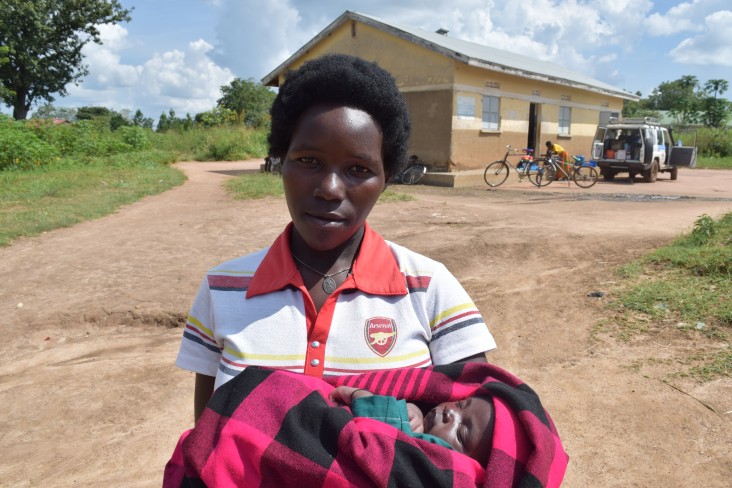Speeches Shim

Eunice Acen was married and pregnant with her first child at age 18. Like others in her community, she believed disclosing her pregnancy early would result in a miscarriage. As a result, Eunice decided not to receive antenatal care and, sadly, her fears came true: she miscarried and had to be hospitalized because of complications.
“If I had attended antenatal care, these complications could have been avoided,” Eunice says as she recounts the painful ordeal of losing her first pregnancy.
In Lira district, where Eunice lives, only 22% of pregnant women receive antenatal care within the first three months of their pregnancies. Most women attend their first appointment closer to their due date. To encourage women to seek medical attention in their first trimester, throughout their pregnancy, and after giving birth, USAID is working with the civil society organization Caritas Lira to organize pregnant women into community-based care groups overseen by a village health team. Care groups have been shown to improve service uptake and give women a chance to offer peer support to other women in their communities.
Village health teams work in communities like Eunice’s to educate women on the importance of antenatal care and to connect them to care groups. The teams also let women know they can receive other services at health facilities including HIV testing, postnatal care, and family planning. The care groups organized by Caritas Lira build on existing groups of women, such as village saving and loan groups, which makes the groups more sustainable.
The care groups meet on a weekly basis at a central location in the community. Women share their motherhood experiences and identify ways to address their common challenges. They also advise other pregnant and lactating mothers on recommended health care practices.
Eunice heard about the care groups, and when she was pregnant again she joined. With the support of the other women in her care group, Eunice attended all her scheduled appointments, starting when she was two months pregnant. She also received a mosquito net on her first visit to prevent the risk of miscarriage due to malaria and was tested for HIV.
“I delivered a healthy baby at Barr HC III. My baby is growing normally, and now there is peace in my family. If I had not started my antenatal care before three months elapsed, I would have probably lost my baby again,” Eunice says.
With support from the village health team, Eunice attended her postnatal care visits at six hours, six days, and six weeks after giving birth. She also learned about the family planning options available to her and chose the one best suited to her and her family’s needs.
Caritas Lira, with grant support from USAID, has worked with village health teams to form 108 care groups in 25 sub-counties of Lira and Oyam districts. Over 4,230 pregnant women have been supported to attend antenatal care in their first trimester and have received information on HIV prevention, the benefits of facility deliveries, birth preparedness, family planning services, postnatal care, nutritional support, immunization services, malaria prevention services, and sanitation and hygiene.
Having benefited from her experience with care groups, Eunice remains committed to making sure other women have information about health care services that can reduce the risk of complications in pregnancy.
“As a care group member, I shall reach out to more pregnant women in my community to attend the first antenatal care visit before three months,” she says.
The USAID Regional Health Integration to Enhance Services – North, Lango activity (RHITES-Lango) works with the Ministry of Health to strengthen Uganda’s health systems through promoting the adoption of healthy behaviors by raising awareness at the individual, provider, and community levels, reducing delays in seeking care, and lowering socio-cultural barriers to service uptake.

Comment
Make a general inquiry or suggest an improvement.